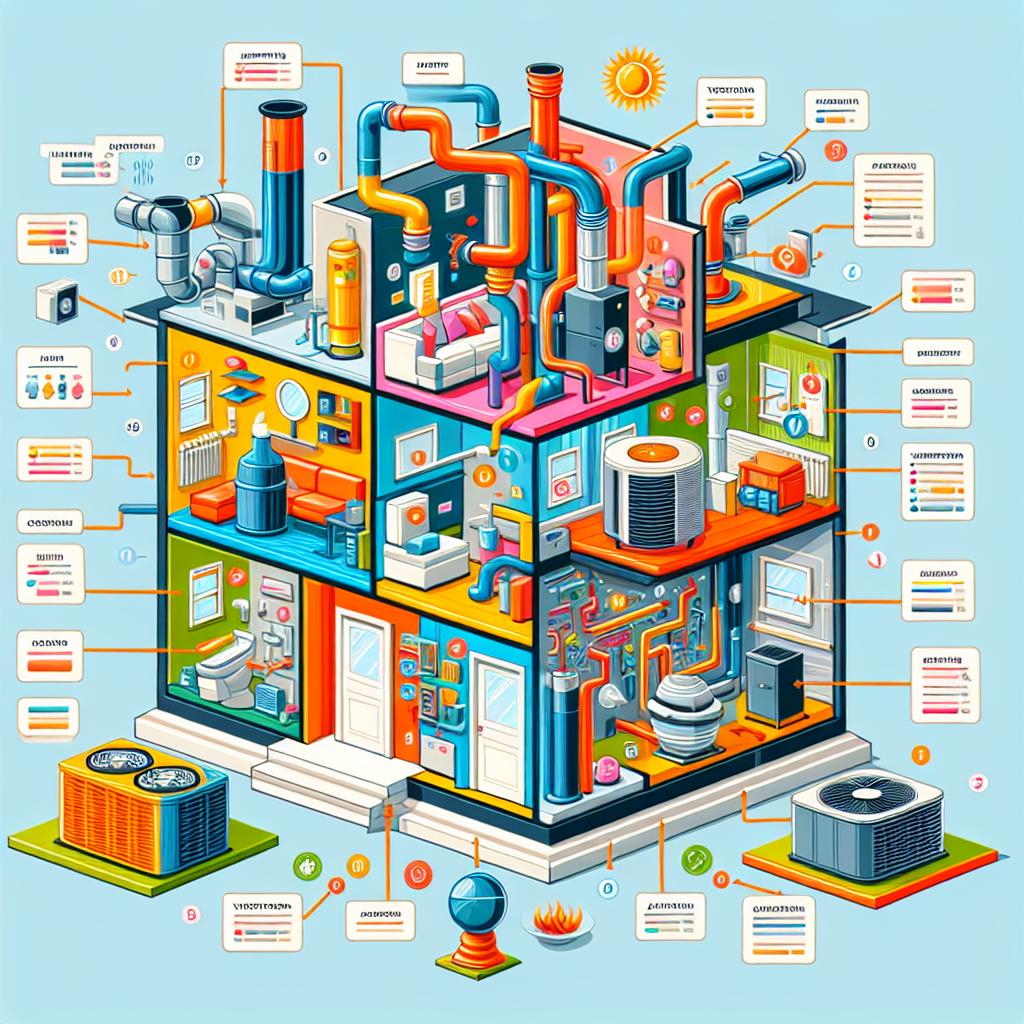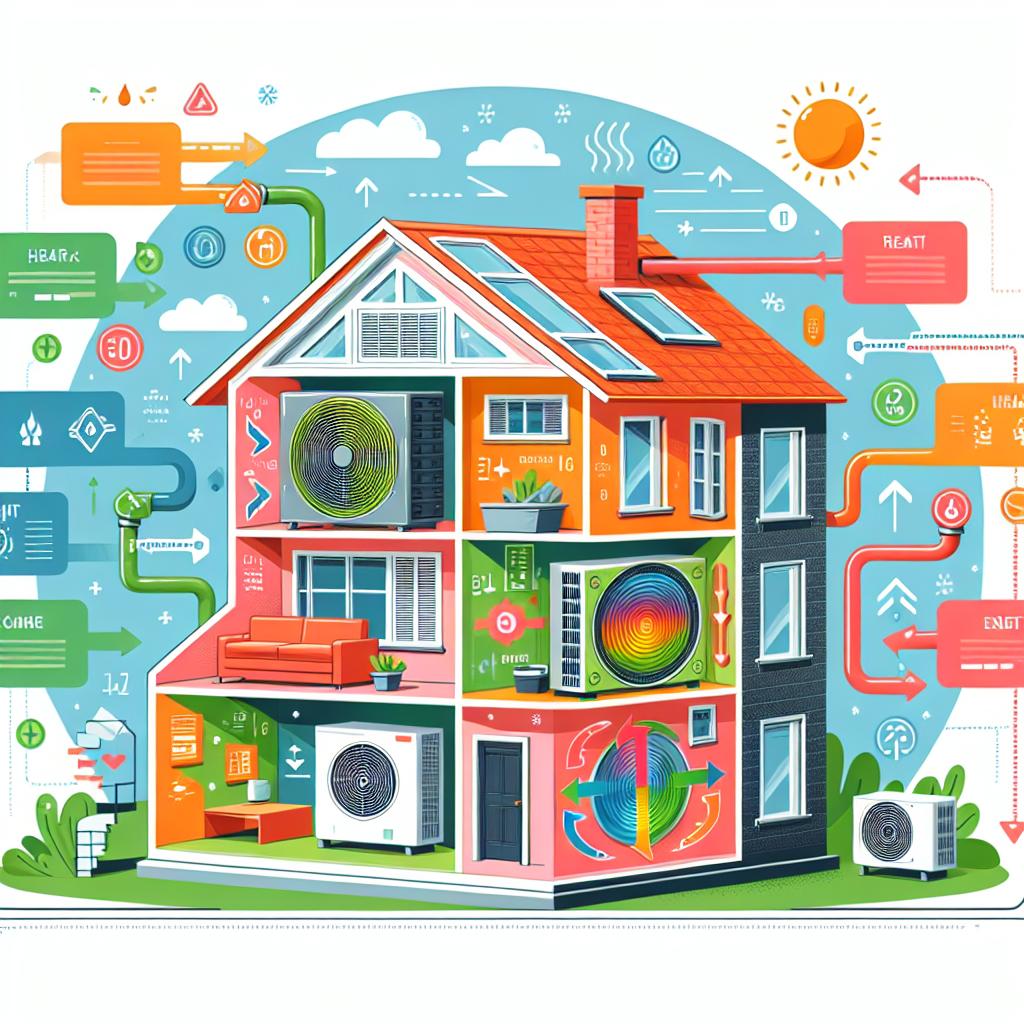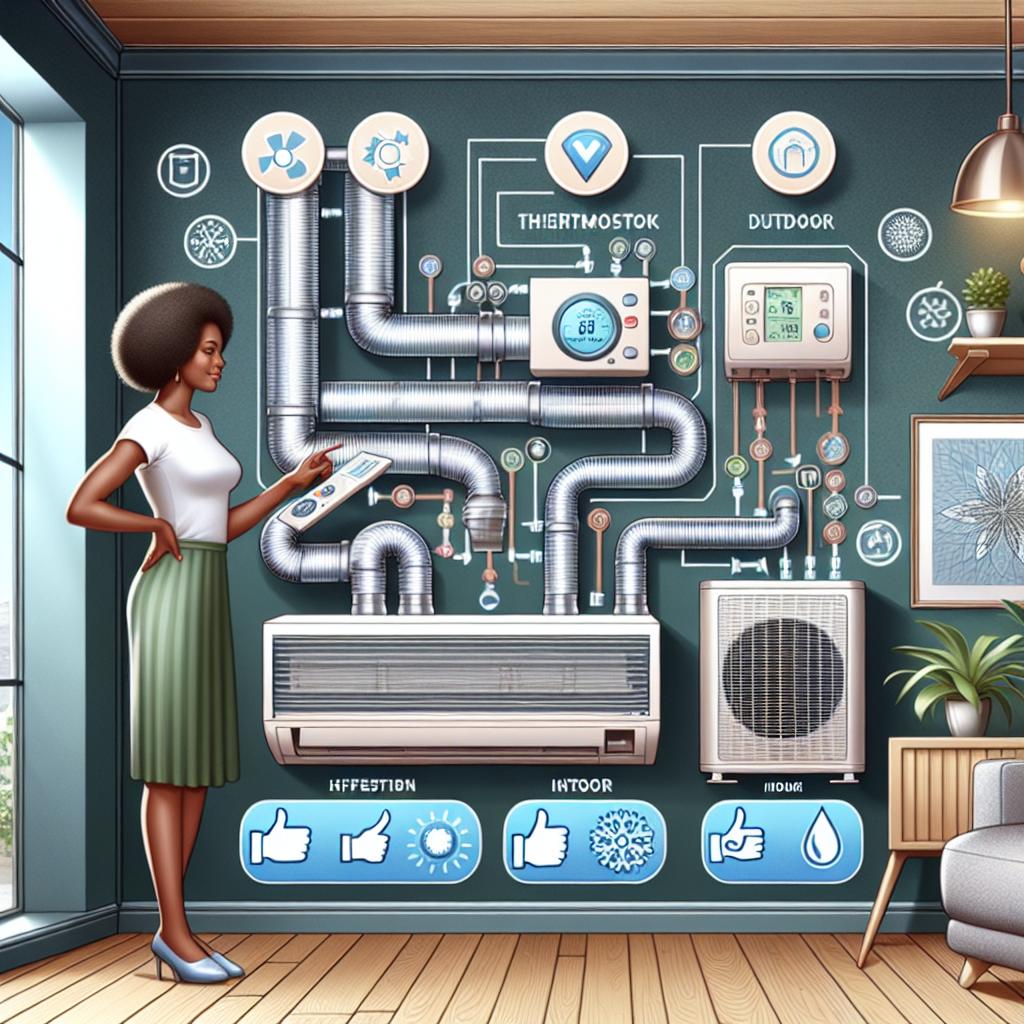In the intricate dance of modern living, where comfort and efficiency intertwine, the HVAC system stands as a silent guardian, orchestrating our indoor environments. But what exactly is an HVAC system? This often-overlooked marvel of engineering transcends mere heating and cooling; it encompasses a sophisticated network designed to maintain air quality, regulate temperature, and ensure our spaces feel just right, regardless of the whims of the weather outside. In this article, we will unravel the layers of HVAC systems, exploring their components, functions, and the vital role they play in our daily lives, creating a sanctuary of comfort in an ever-changing world. Join us on this journey to demystify the heartbeat of our homes and workplaces—where the art of climate control meets the science of engineering.
Understanding the Components of an HVAC System
An HVAC system is composed of several key components working harmoniously to ensure a comfortable indoor environment. Each part plays a crucial role, from heating during cold months to cooling in the summer. The main components include:
- Heating Unit: This can be a furnace, boiler, or heat pump responsible for generating heat.
- Cooling Unit: Typically an air conditioner or heat pump that removes heat to cool the air.
- Ventilation System: This includes ductwork and fans that facilitate airflow to distribute conditioned air evenly.
- Thermostat: The device that allows users to set and maintain their desired temperature.
- Filters: Essential for trapping dust and allergens, ensuring clean air circulation.
To better understand how these components work together, consider the following breakdown of their interactions:
| Component | Function |
|---|---|
| Heating Unit | Generates warmth during cold seasons. |
| Cooling Unit | Removes heat to cool down the space. |
| Ventilation System | Circulates air and maintains air quality. |
| Thermostat | Controls the temperature settings based on user preferences. |
| Filters | Ensures clean air by filtering out pollutants. |

The Role of HVAC Systems in Energy Efficiency
In today’s world, the significance of HVAC systems goes beyond mere comfort—they are essential players in the quest for energy efficiency. By effectively regulating indoor temperatures, these systems can drastically reduce the energy consumed for heating and cooling, leading to lower utility bills and a reduced carbon footprint. Advanced technologies such as variable speed motors and programmable thermostats contribute significantly, allowing users to optimize energy use based on real-time needs. Moreover, regular maintenance can enhance system performance, ensuring that it operates at peak efficiency.
Another vital aspect of HVAC systems in promoting energy efficiency is their integration with renewable energy sources. Modern systems can work harmoniously with solar panels and geothermal power, which not only lowers energy consumption but also enhances the sustainability of a home or building. The following table outlines the benefits of integrating energy-efficient HVAC systems:
| Feature | Benefit |
|---|---|
| Programmable Thermostats | Adjusts temperature settings automatically, reducing energy waste. |
| Variable Speed Blowers | Provides consistent air quality while using less energy. |
| Smart Home Integration | Allows remote monitoring and control for further energy savings. |
| Regular Maintenance | Ensures efficient operation and prolongs system life. |

Common Maintenance Practices for Optimal Performance
To ensure that your HVAC system operates efficiently, regular maintenance is crucial. Simple practices can prolong the life of your system, enhance energy efficiency, and prevent unexpected breakdowns. Here are some essential maintenance tasks you should incorporate into your routine:
- Change or clean filters every 1-3 months to maintain airflow and air quality.
- Inspect ductwork for any leaks or blockages that could hinder performance.
- Schedule annual professional inspections to identify potential issues before they escalate.
- Clean outdoor units and remove debris to allow for better airflow and efficiency.
- Check and calibrate the thermostat to ensure accurate temperature regulation.
In addition to these tasks, maintaining a clean environment around your indoor and outdoor units can significantly enhance their performance. Another effective strategy is to create a maintenance checklist to keep track of essential tasks and service dates. This could look something like:
| Task | Frequency | Status |
|---|---|---|
| Change Filters | Every 1-3 months | Pending |
| Professional Inspection | Annually | Complete |
| Clean Outdoor Units | Seasonally | Pending |
By diligently following these maintenance practices, you can maximize the efficiency and longevity of your HVAC system, ensuring it continues to provide optimal comfort in your home or business year-round.

Selecting the Right HVAC System for Your Needs
Choosing an HVAC system that aligns with your specific requirements involves several critical considerations. First, assess the size of your space. An undersized unit can lead to insufficient heating or cooling, while an oversized unit may cycle on and off frequently, wasting energy and affecting comfort levels. The following factors should be evaluated:
- Energy Efficiency: Look for energy-efficient models that carry the ENERGY STAR label.
- Type of System: Determine if you need a central heating and cooling system, a ductless mini-split, or a window unit based on your home’s layout.
- Climate Considerations: Take into account the regional climate to select a system capable of effectively managing extreme temperatures.
- Budget: Factor in both the initial cost of the unit and long-term operational costs.
It’s also beneficial to consult replacement options for older units. HVAC technology evolves, often leading to enhanced energy efficiency and better environmental impact. The following table summarizes common HVAC options and their benefits:
| HVAC Option | Benefits |
|---|---|
| Central Air Conditioning | Even cooling, compatible with existing ductwork |
| Ductless Mini-Split | Flexible installation, zoned heating and cooling |
| Heat Pumps | Efficient year-round climate control and lower utility bills |
| Geothermal Systems | Environmentally friendly with long-term energy savings |
Q&A
Q&A: Understanding HVAC Systems
Q: What does HVAC stand for?
A: HVAC stands for Heating, Ventilation, and Air Conditioning. It encompasses the technology used to regulate indoor climate, ensuring comfort in homes, offices, and other buildings.
Q: How does an HVAC system work?
A: An HVAC system works by integrating three critical functions: heating warms up spaces during the cold months, ventilation maintains air quality by circulating fresh air, and air conditioning cools the environment during warm weather. These systems use various components—like furnaces, air conditioners, and ductwork—to achieve their purpose.
Q: What are the main components of an HVAC system?
A: The main components of an HVAC system include a heating unit (like a furnace or heat pump), cooling units (such as air conditioners), ductwork for air distribution, thermostats for temperature control, and ventilation systems for circulating fresh air.
Q: Are all HVAC systems the same?
A: Not at all! HVAC systems vary widely in design and function based on factors like geographic location, building size, and specific climate needs. For instance, some regions may rely heavily on heating, while others may prioritize air conditioning. Additionally, some systems are designed to be more energy-efficient than others.
Q: What are the benefits of a well-maintained HVAC system?
A: A well-maintained HVAC system enhances indoor air quality, ensures consistent comfort, and can lead to lower energy bills. Regular maintenance helps prevent breakdowns and extends the lifespan of the equipment, making it a worthwhile investment for homeowners and building managers alike.
Q: How often should I service my HVAC system?
A: It’s generally recommended to service your HVAC system at least once a year. Ideally, you should schedule heating maintenance in the fall and cooling maintenance in the spring to prepare for the respective seasons. This will help ensure optimal performance year-round.
Q: Can I install an HVAC system myself?
A: While DIY projects can be rewarding, installing an HVAC system often requires specialized knowledge and skills. It is usually best to hire certified professionals to ensure the system is installed correctly, safely, and efficiently, complying with local codes and standards.
Q: What should I look for when choosing an HVAC system?
A: When choosing an HVAC system, consider factors such as system type (central or ductless), energy efficiency ratings (like SEER for air conditioners), the size of your space, and your specific heating and cooling needs. Consulting with an HVAC professional can also provide you with insights tailored to your situation.
Q: How can I improve my HVAC system’s energy efficiency?
A: Improving your HVAC system’s energy efficiency can be achieved through various methods, including regular maintenance, sealing ducts for any leaks, using a programmable thermostat, and considering upgrading to energy-efficient models. Ensuring good insulation in your home can also help reduce the load on your HVAC system.
Q: What is the future of HVAC technology?
A: The future of HVAC technology is exciting! Innovations in smart systems, renewable energy integrations, and enhanced energy efficiency are on the rise. As homeowners seek more sustainable solutions, advancements like solar HVAC units and advanced climate control systems are becoming increasingly common, promising greater comfort with a smaller environmental footprint.
Q: Why is understanding HVAC systems important?
A: Understanding HVAC systems is essential for ensuring your living or working environment remains comfortable, healthy, and energy-efficient. Knowledge of how these systems operate can empower you to make informed decisions regarding installations, maintenance, and upgrades, ultimately leading to better indoor climate control and cost savings.
The Way Forward
As we draw the curtains on our exploration of HVAC systems, it’s clear that these technological marvels are not mere luxuries but essential components of modern comfort and efficiency. From the cool embrace of air conditioning on a sweltering summer day to the cozy warmth of heating during the chill of winter, HVAC systems play a pivotal role in our daily lives. They are the unsung heroes that maintain the delicate balance of temperature and air quality, ensuring we can thrive in our indoor environments.
Understanding how HVAC systems operate empowers us to make informed choices about our comfort, energy efficiency, and environmental impact. Whether you’re considering an upgrade, a repair, or simply trying to understand the hum of that familiar machinery in your home, knowledge is your best tool. As you step away from this article, may you carry with you a newfound appreciation for the intricate dance of technology and comfort that makes every breath indoors just a little more pleasant.

